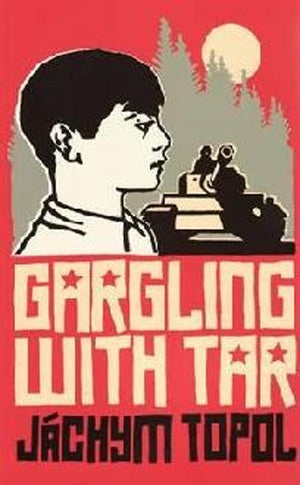Gargling with Tar, By Jáchym Topol, trans. David Short
A tank-ride through the Czech past

Your support helps us to tell the story
From reproductive rights to climate change to Big Tech, The Independent is on the ground when the story is developing. Whether it's investigating the financials of Elon Musk's pro-Trump PAC or producing our latest documentary, 'The A Word', which shines a light on the American women fighting for reproductive rights, we know how important it is to parse out the facts from the messaging.
At such a critical moment in US history, we need reporters on the ground. Your donation allows us to keep sending journalists to speak to both sides of the story.
The Independent is trusted by Americans across the entire political spectrum. And unlike many other quality news outlets, we choose not to lock Americans out of our reporting and analysis with paywalls. We believe quality journalism should be available to everyone, paid for by those who can afford it.
Your support makes all the difference.I first heard Jáchym Topol praised in Prague as the definitive voice of Czech post-Communist dislocation. His samizdat poetry won the Tom Stoppard prize for unofficial literature before the 1989 Velvet Revolution. But his first novel in 1994 (translated as City Sister Silver) captured the throbbing dawn of the "velvet hangover".
Topol's fourth novel, Gargling with Tar, is a crashing, free-wheeling tank ride of a book. It is set in the Bohemian forests in 1968, during the crushing of the Prague spring of Topol's boyhood. Yet its version is not entirely trustworthy: gargling with coal-tar soap is the punishment for telling fibs in the boys' home where the orphan narrator grows up.
Ilya (meaning donkey) cares for his disabled brother, Monkeyface, in a home run by nuns, among abandoned Czechs, "Ruskies, Asians, gippos", where "shortpants" rule over even smaller "longshirts". When Communists oust the nuns after the uprising, anarchy breaks out, until the Czechoslovak army enlists the lads for training. As Warsaw Pact troops invade, Ilya becomes a saboteur and guide, switching sides between "arsehole" defenders of socialism with a human face, and Captain Yegorov's Soviet tank column – clueless after nationalists deface signposts.
Yegorov is tasked with security for a model socialist circus to showcase the cultural benefits of invasion. This allows for exotic encounters with an East German acrobatic dwarf, Ukrainian bear-handlers and Mongolian camels. But the Bulgarians' mermaid is a kidnapped girl. Ilya becomes complicit in the armies' gathering of spoils.
The boy is a fabulist whose double, as he tells it, is sexually abused by a Communist hero of the uprising. The novel is as scathing about Czech nationalism as about the nuns' indoctrination. For Ilya, his mind filled with folktales and The Catholic Book of Knowledge, the Bohemian nation is Czechia, a soldiers' pornographic pin-up. But he nails historical truths – Czech commanders cowed by Siberian gulags, Ukrainians scarred by famine, country folk locked in burning barns. Ilya's shift between dubious adoptive fathers mirrors adult betrayals: Communists in Prague "cosy with the Moskies", while "the world cared damn all... about Czechoslovakia".
As the acrobat says, "up this Czech end of shit creek", those in the middle have to survive. Few Czech novelists have tackled 1968 head-on. Topol does so with bracing irreverence as well as pity.
Join our commenting forum
Join thought-provoking conversations, follow other Independent readers and see their replies
Comments